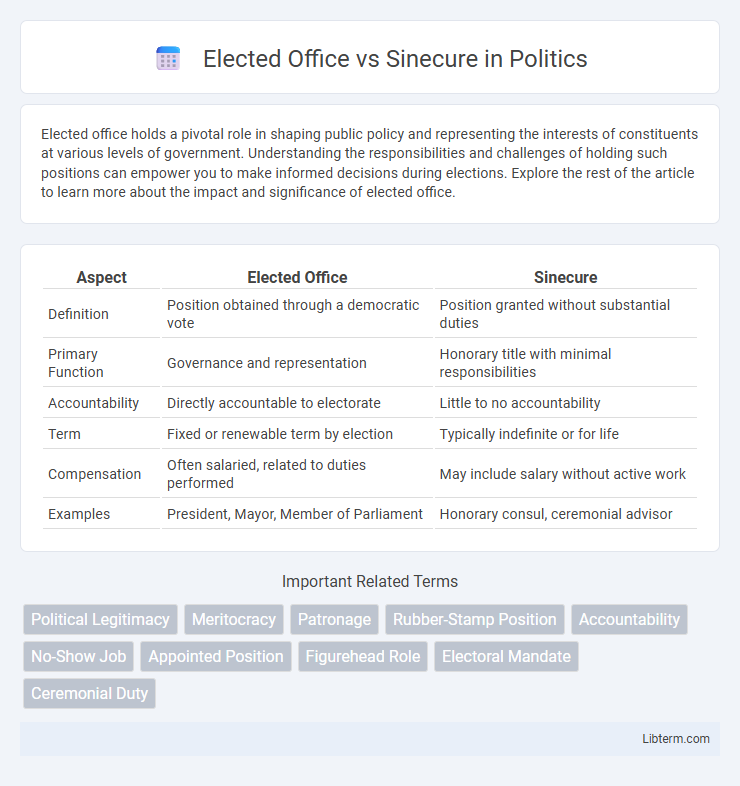Elected office holds a pivotal role in shaping public policy and representing the interests of constituents at various levels of government. Understanding the responsibilities and challenges of holding such positions can empower you to make informed decisions during elections. Explore the rest of the article to learn more about the impact and significance of elected office.
Table of Comparison
| Aspect | Elected Office | Sinecure |
|---|---|---|
| Definition | Position obtained through a democratic vote | Position granted without substantial duties |
| Primary Function | Governance and representation | Honorary title with minimal responsibilities |
| Accountability | Directly accountable to electorate | Little to no accountability |
| Term | Fixed or renewable term by election | Typically indefinite or for life |
| Compensation | Often salaried, related to duties performed | May include salary without active work |
| Examples | President, Mayor, Member of Parliament | Honorary consul, ceremonial advisor |
Defining Elected Office and Sinecure
Elected office refers to a position of authority or public service filled through a formal voting process, where candidates are chosen by constituents to represent their interests. A sinecure is a position requiring little to no work but providing financial benefit or status, often granted as an honor rather than based on merit or election. While elected offices involve accountability and active duties, sinecures lack substantive responsibilities despite offering compensation or prestige.
Historical Origins of Sinecure Positions
Sinecure positions originated in medieval Europe as unpaid or nominal offices granted by monarchs or religious institutions to reward loyalty without requiring active duties. Historically, these posts allowed individuals to receive income or status while freeing them from administrative responsibilities typical of elected offices. The contrast between elected office and sinecure lies in the former's accountability to constituents versus the latter's tenure based on patronage and privilege.
The Democratic Process Behind Elected Offices
Elected offices are central to the democratic process, ensuring representatives are chosen through free and fair elections that reflect the will of the people. These positions carry defined responsibilities, accountability, and legal obligations to serve constituents and make policy decisions. In contrast, sinecures offer paid positions with little to no actual duties, lacking the transparent electoral legitimacy essential in democratic governance.
Powers and Responsibilities: Elected Officials vs Sinecures
Elected officials possess defined powers and responsibilities derived from the electorate, including lawmaking, policy enforcement, and public accountability, ensuring they serve constituents' interests. In contrast, sinecure positions offer titles with little to no actual duties or decision-making authority, often providing a salary without corresponding responsibilities. The essential difference lies in elected offices requiring active governance and responsiveness, whereas sinecures primarily function as honorary or symbolic roles lacking substantive power.
Public Accountability and Transparency
Elected office requires individuals to be accountable to the public through regular elections, ensuring transparency in decision-making and policy implementation. In contrast, sinecure positions often lack direct public oversight, reducing the mechanisms for accountability and potentially leading to opaque governance. The democratic process in elected offices strengthens public trust by mandating disclosure and responsiveness, whereas sinecures may prioritize ceremonial roles without substantive transparency.
Financial Compensation and Job Security
Elected office offers financial compensation that varies widely depending on the level of government and jurisdiction, providing a salary that reflects public accountability and workload. Job security in elected positions is inherently unstable, contingent on voter approval and electoral cycles, often lasting only the term of office. In contrast, sinecures provide fixed financial compensation with minimal responsibilities and high job security, as these roles are typically government-appointed or hereditary, lacking performance-based risk.
Real-World Examples: Elected Offices vs Sinecures
Elected offices, such as the U.S. presidency or city mayor positions, require candidates to run campaigns and gain voter approval, ensuring accountability and public service. In contrast, sinecures like historical English honorary titles or certain ceremonial parliamentary roles often come with salary or privileges but lack substantial duties or responsibilities. Real-world examples highlight the distinction: elected roles influence policy and governance, while sinecures typically serve symbolic or traditional purposes without direct administrative power.
Impact on Governance and Public Trust
Elected office holders are directly accountable to constituents, promoting transparency and responsiveness that strengthen public trust and improve governance effectiveness. In contrast, sinecure positions often lack clear responsibilities and oversight, which can undermine accountability and foster public skepticism toward government institutions. The presence of genuine elected offices typically enhances democratic legitimacy and policy responsiveness, whereas sinecures may contribute to inefficiency and erode confidence in political systems.
Reforming Sinecures in Modern Governments
Reforming sinecures in modern governments addresses inefficiencies by eliminating nominal positions granted without responsibilities or meaningful duties. Implementing transparent appointment criteria and accountability measures ensures public resources are utilized effectively while promoting merit-based governance. Such reforms enhance institutional integrity and foster greater trust in elected offices compared to sinecures.
Choosing Between Merit and Patronage in Public Roles
Elected office prioritizes merit by enabling voters to select candidates based on qualifications and policy stances, ensuring accountability and public trust in governance. Sinecure positions often rely on patronage, granting rewards or titles with minimal responsibilities, which can undermine effectiveness and transparency in public roles. The choice between merit-based election and patronage-based appointment fundamentally impacts the integrity and performance of governmental institutions.
Elected Office Infographic

 libterm.com
libterm.com